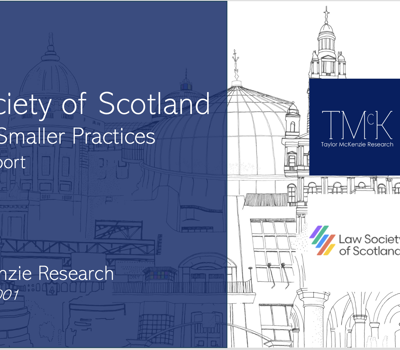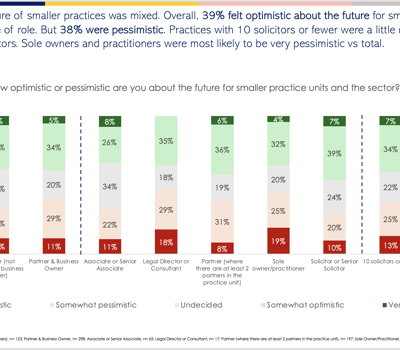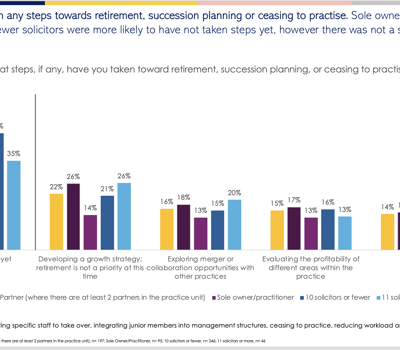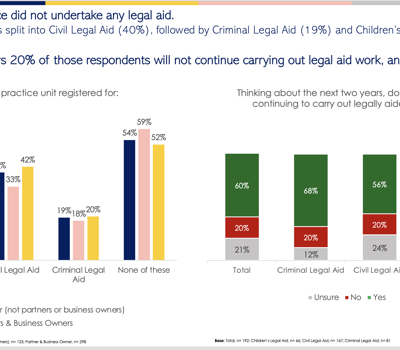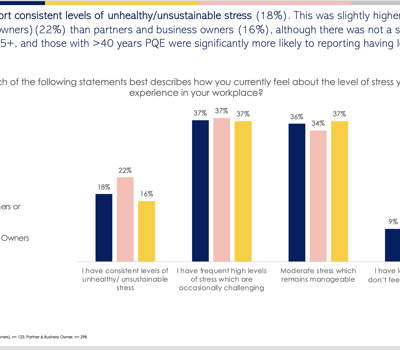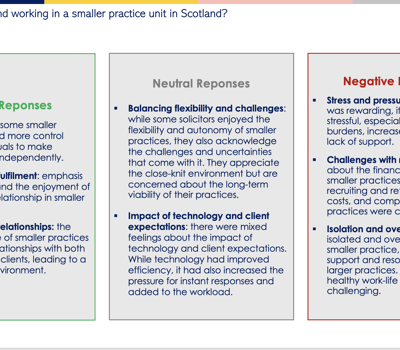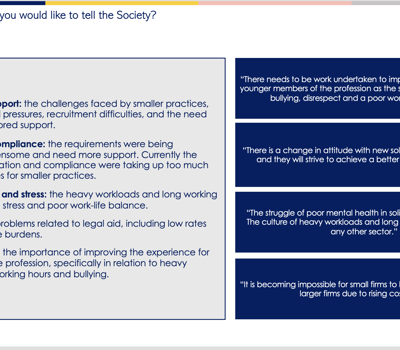Explore state of high-street law in Scotland in numbers from survival to growth

Small law firms in Scotland are facing existential threats: technology changing apace, a new generation of trainees, partners looking to sustain businesses, and customer expectations shifting. This is what the numbers tell us.
This summer, the Law Society of Scotland published a comprehensive study of the country’s smaller firms (defined as those with 39 or fewer solicitors), which concluded that many practitioners are upbeat about the future despite those challenges.
But the qualitative and quantitative data compiled from more than 400 partners, business owners and senior solicitors also revealed underlining crises.
In particular, there is a marked difference in outlook between firms that do and those that do not offer legal aid services. Yet another symptom of Scotland’s worsening legal aid crisis.
The Society set out to profile these firms, and to understand the impact of technology, work culture and the regulatory burden, as well as staff retention and the career ambitions of practitioners.
Key findings
- 34% of respondents reported a negative impact from staff turnover.
- 29% of non-partner respondents have aspirations to become a partner while 44% do not want to become a partner.
- 46% of non-partner respondents said that lack of training/knowledge of new technology was among the biggest technological challenges they faced.
- Nearly one in five respondents reported having consistent levels of unhealthy/unsustainable stress.
The full research report can be read here.
Reaction of former small firm owner and Society President
New Society President Patricia Thom is a former small firm owner and, following the publication of the research (conducted by Taylor McKenzie Research), said: “Smaller firms play a vital role in Scotland’s legal landscape and this research shows there’s a bright future ahead, albeit with some challenges.
“The thoughtful responses we’ve received have given us a better understanding of the opportunities and challenges for smaller firms, and we’ll now be reviewing the advice and support we offer to members in light of this information.
“We believe that technology is at least part of the solution for a number of the challenges facing smaller firms. This research indicates that there are barriers around training and knowledge that need to be removed to unlock that potential.
“It’s concerning to hear that stress remains such an issue for many smaller firm solicitors. Mental health and wellbeing are core focuses of the Law Society. We provide tools to navigate stress, and guidance on reducing or removing its causes altogether where possible.”
Joshua's Journal Analysis
Overall sentiment
The overall sentiment of those surveyed about the future of their practices was mixed, with an almost even split of 39% feeling optimistic about the future and 38% feeling pessimistic.
- Practices with 10 or fewer solicitors were more optimistic, but sole practitioners were most likely to be very pessimistic.
- If a practice was involved in offering legal aid work, they were significantly more likely to be very pessimistic about their future and the future of the small firm sector as a whole than those not offering legal aid (19% vs. 5%).
Opportunities
Among the positive attitudes for the future, several key areas have been highlighted as smaller firms’ strengths, including a more personalised service, the integration of technology, more competitive fees, better work culture and retention, consolidation in the market and greater specialisation.
One respondent said:
“I think that there’s certainly still a very high demand for the sort of work that we do, and the clients that we have seem to want to deal with a firm that’s local to them and they can actually speak to the solicitors working on their case.”
Threats
Clearly, however, there are existential threats to the survival of Scotland’s smaller practices. It is a precarious market. Practitioners are concerned about increasing competition with larger practices, being absorbed by rivals and the burden of regulation (the study was conducted before the passing of the Regulation of Legal Services (Scotland) Bill).
What’s more, recruitment and retention is a ‘major issue’ as these high-street and rural firms struggle to offer competitive salary and benefits in comparison to larger practices. Economic pressures, which are affecting small businesses across different sectors, present dangers, with instability, higher running costs and taxes highlighted.
Legal aid funding could be the final straw for firms offering such work, and shifting client expectations (more consumers expect AI-driven services, for instance, and lower fees).
“Big firms are swallowing up the small firms creating a power struggle and leaving small firms having to justify their existence.”
Talent
Earlier this year the Journal explored the next generation of Scottish legal talent, the skills they bring and the expectations of the profession they carry. The message was comprehensive and clear: the next generation expect the profession to change and to be the ones to change it, with improvements in work culture and balance, ESG considerations and development opportunities prioritised.
But what does this mean for smaller firms? Broadly speaking, solicitors at these practices felt turnover was at an ‘expected’ level (60% of responses), although larger small firms (with 11 or more solicitors) were significantly more likely to consider turnover ‘higher than expected’ compared to those with 10 or fewer practitioners (37% vs. 14%). This likely speaks to the benefits of office culture in smaller businesses.
So why, aside from pay, are talented solicitors leaving smaller firms? Key issues highlighted by the respondents include lack of clear career progression with opportunities more limited in smaller environments; the perceived lack of variety in work in comparison to full-service firms; high workloads and pressure; limited employee benefits and resources including technology; and, finally, questions of prestige when comparing experience at high-street firms and flagship practices.
“We’re finding that young solicitors, newly qualified solicitors, trainees, often they gravitate to the big cities. They’ll go to Glasgow and Edinburgh because they see it as having more opportunities there or once they qualify, because the money is better, there’s better benefits, better security. So, trying to attract young solicitors to work, particularly in a firm that is not in one of the big cities, is pretty difficult.”
Succession planning
What does the future hold for the firms themselves?
- 44% of respondents had not taken steps towards retirement, succession planning or ceasing to practise. Sole owners and practices with 10 or fewer solicitors were even more likely to have taken no steps.
- The majority (53%) view succession as their preferred exit strategy.
- Only 20% have a succession plan in place, and 30% are considering a plan but have yet to put it into action.
Legal aid
The starkest revelations in the report were about the future of legal aid and these should worry all those in the profession and in society more broadly. This is unquestionably a crisis.
In the next two years, 20% of respondents who currently conduct civil, criminal or children’s legal aid work will not still be carrying it out, with a further 20% unsure. More than half of the surveyed solicitors do not undertake legal aid work now, and nearly half of those who currently do may not be doing so come 2027.
The biggest drivers for maintaining the system are the needs of their communities and a sense of moral obligation to provide access to justice, especially for vulnerable clients. Can a point of principle alone sustain a system that is not currently economically viable?
Those who expect to stop their legal aid provision consider it no longer profitable, too heavy an administrative burden and highly stressful.
Taylor McKenzie Research concluded the general sentiment of those surveyed was ‘overwhelmingly negative’.
One respondent added:
“We are still working on legal aid rates from 20, 30 years ago. We can do difficult, complex, long-running cases and be doing them for less than minimum wage. That’s a common thing because of the way the blocked fees work for civil legal aid. You can do a horrible case that takes up half your life, and you do loads of hard work on it and do a really good job, and you come out earning less than minimum wage. That’s just not acceptable.”
Technology
Technology may be the issue that represents a great opportunity and a great threat in equal measure. Could new technologies be a life raft for ailing or under-threat smaller practices?
Currently Microsoft Office (or similar) is the most commonly used digital technology, which is to be expected – 92% of respondents use it – followed by 82% uptake of video call platforms such as Teams or Zoom, and some form of case management software at 72%.
At the other end of the technology spectrum, only 6% of smaller firms currently use AI in their work, and predominantly for research tasks. Furthermore, it’s not rated as effective by those who do use it.
Practices with 11 or more solicitors typically consider themselves as closer to being fully digital when compared with those with fewer practitioners (62% vs. 55%).
Is it perhaps a question of knowledge and training? Time constraints were highlighted as a barrier to uptake, with solicitors in these smaller firms struggling to find time to adopt, train on and use new tech. Instead, practitioners are reliant on the platforms already provided by their firms, as change is resource intensive. There is also a feeling that the legal sector is both sceptical about embracing AI and other new tools, and slow to do so when compared with the broader service economy.
“Quite knowledgeable as to what is available. However, the rate of technological advancement is greater than the rate at which individuals can be upskilled to fully (or even partially) understand the pros and cons of using certain technologies.”
That said, those who have adopted new technology are feeling the benefit, with three-quarters of respondents believing it had helped how they interact with clients and just 9% feeling it had a negative impact.
Software such as video conferencing and calls have enabled communication with clients to be easier, quicker and cheaper. This is a result of a swift shift during the Covid-19 pandemic. This remote way of conducting legal business has made law services more accessible to many clients and more efficient for all parties.
But technology is also viewed as a barrier to building relationships and human interaction, long considered the strongest draws of local high-street firms. It has also increased client expectations of how quickly their representatives respond, including outside business hours. This is a shift seen across the service industry. And, finally, ‘low-digital clientele’ (often older or vulnerable clients) are facing more challenging access to law and justice.
Work culture
- A fifth of respondents view the level of stress they experience as a result of work unhealthy or unsustainable, a figure that rises from 18% to 22% for solicitors who are not business owners.
- Experienced practitioners aged 65 and over, and those with more than 40 years’ post-qualified experience, reported significantly lower stress.
- 63% of respondents feel overstretched and need to work extra hours to meet deadlines.
What are the top causes of stress and poor work-life balance? Client demands, regulations, and profitability and cashflow are the issues proverbially keeping solicitors up at night.
“I know that some of the bigger firms have said that they make a conscious effort to promote wellbeing at work. They encourage staff to take breaks or do things like that, or they allocate them days off work that are annual leave, but they are wellbeing days. And I know that in the Procurator Fiscal Service, they are allocated a mental health hour – I think it’s either daily or every second day – where they can take a break for an hour to do something to reset. That’s a very stark comparison to where I am, as I have a boss who’s in his 50s who doesn’t want to hear about mental health. So just maybe something to raise awareness across the board.”
Career progression
As alluded to earlier on, the younger generations of solicitors entering into and rising through the profession have different career ambitions and expectations compared with those who have gone before. For instance, just 29% of solicitors who are not partners or business owners now aspire to become a partner. Nearly 50% say they have no aspirations for that kind of career progression, driven by maintaining a better work-life balance and protecting themselves from additional stress.
“I find the combination of increasing regulatory role and advance in technology are changing the job. I do not think that there will be a place for my current role in 10 years and I do not want to spend so much time on AML compliance.”
How the research was carried out
The Review of Smaller Practices Research Report July 2025 was produced by Taylor McKenzie Research on behalf of the Law Society of Scotland.
It was conducted via online self-completion survey of partners and business owners as well as solicitors who were not partners or business owners but did have at least five years post-qualification experience working within smaller firms.
A total of 2,543 solicitors were sent an email survey, and 421 responded between January and February this year, a response rate of 17 per cent.
The full research report can be read here.


